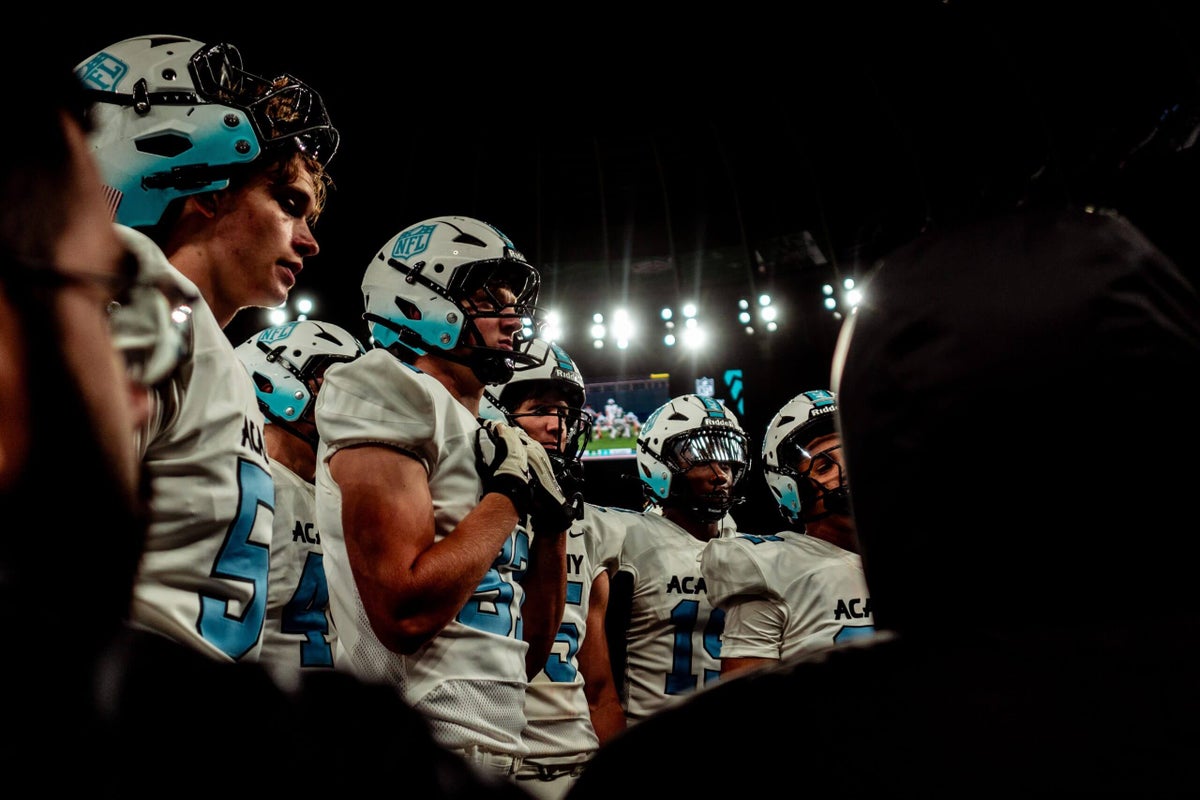Thousands of miles from the spotlight of the NFL is the quiet English town of Loughborough.
Situated in the middle of the country, nestled in the countryside and in the shadow of nearby cities Leicester and Nottingham, it is a small town famous for its university, a 500-acre campus renowned for sporting excellence.
Perhaps differing from the stereotypical English student experience of nights out, hangovers and last-minute revision, this is where some of the country’s finest athletic prospects train. Indeed, the university would have finished sixth in the overall 2022 Commonwealth Games medal table if it was a country.
And it is here that 68 students of the NFL Academy are striving to achieve their dream of making it in the NFL. Just teenagers, they have been recruited from 20 different countries and are in a three-year high-school equivalent program.
During a behind-the-scenes, two-day visit, The Athletic was put through drills — bettering Tom Brady’s 40-metre dash time from the 2000 draft combine — spoke to a prospect with 21 college offers, and was given an American football tactics class from head coach Steve Hagen to find out what it takes to be part of the NFL’s international pipeline of talent.
Niko Kampas moved to Loughborough from Kaarst, a small German town situated near the borders of the Netherlands and Belgium. A different country, a different language, and 67 new teammates. There is much the 17-year-old has had to adapt to since joining from the Düsseldorf Panthers last summer, a team in the German Football League (GFL) juniors.
But at 6ft 7in (201cm)and 268lbs (121kg), the offensive lineman has had few problems attracting college offers, despite not needing to commit until January 2027. He has already received 21, including from top-20-ranked Division I colleges such as Tennessee, Georgia, and Alabama.
“I like being the underdog, it gives me something to fight for,” says Kampas, whose father, Lampros, played American football in Europe. “My parents are from Spain and Greece, and I grew up in Germany, so I want to represent Europe.”
Like Kampas, the others on the program, all aged between 16 and 19, hope to catch the eye of a college coach over the next three years to earn a sought-after scholarship.
Not everyone applied for the program; some were scouted and a few have little to no experience in the sport, selected instead for the potential shown at recruitment camps held around the world. Judgement was based on physical attributes and assessments made during various football drills.
Most have moved to this market town from far afield: Canada, Mexico, Argentina, Nigeria, Gambia, Syria, Norway, Denmark, Sweden, Finland. There is another academy program for the Asia-Pacific region in south-east Queensland, Australia.
With recruits from all over the world and 20 nationalities represented, the 68-man roster has become increasingly competitive since it started in 2019. There were 3,500 applicants this year for 30 places. There are costs to take up the program, which the NFL do not make public.
But after making it onto the team, that’s where the hard work starts. They wake before the sun to arrive at an otherwise empty Loughborough University gym for 6:30am, where The Athletic rises unusually early to join them. Practice, academic classes (they still go to school), and film sessions are all squeezed in before their day ends around 6.30pm.
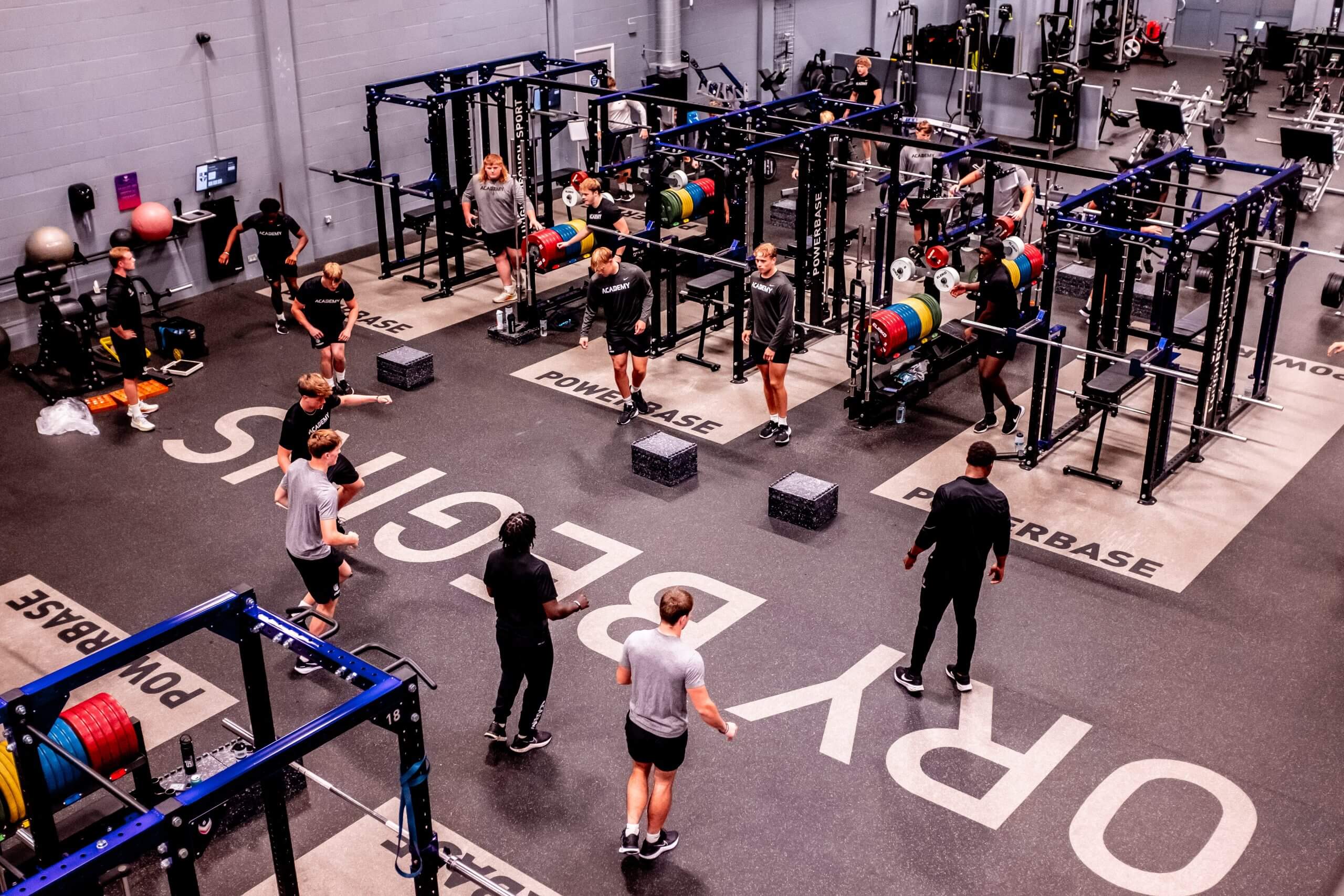
An early gym session at Loughborough campus. (NFL Academy)
Final year student-athlete Nickson Massa, 18, from Hackney, London, which is about an 80-minute train journey away, plays defensive back.
A product of the London Blitz youth team, where he started playing at 14, he got into the academy through a YouTube video. Head of the academy Kris Durham had spotted him during a one-on-one tournament at Tottenham Hotspur Stadium on the channel of Donald De La Haye, known as Deestroying, who has more than six million subscribers and posts American football videos.
“I’ll be lying if I said this is a lifestyle I enjoy every day,” Massa says.
“I sometimes envy living a normal school kid life, going to lessons, just having to worry about exams. Instead, I’ve got to worry about practice and film and all of this stuff, so it’s definitely two different pathways, but I feel like in the end this one will be more rewarding.”
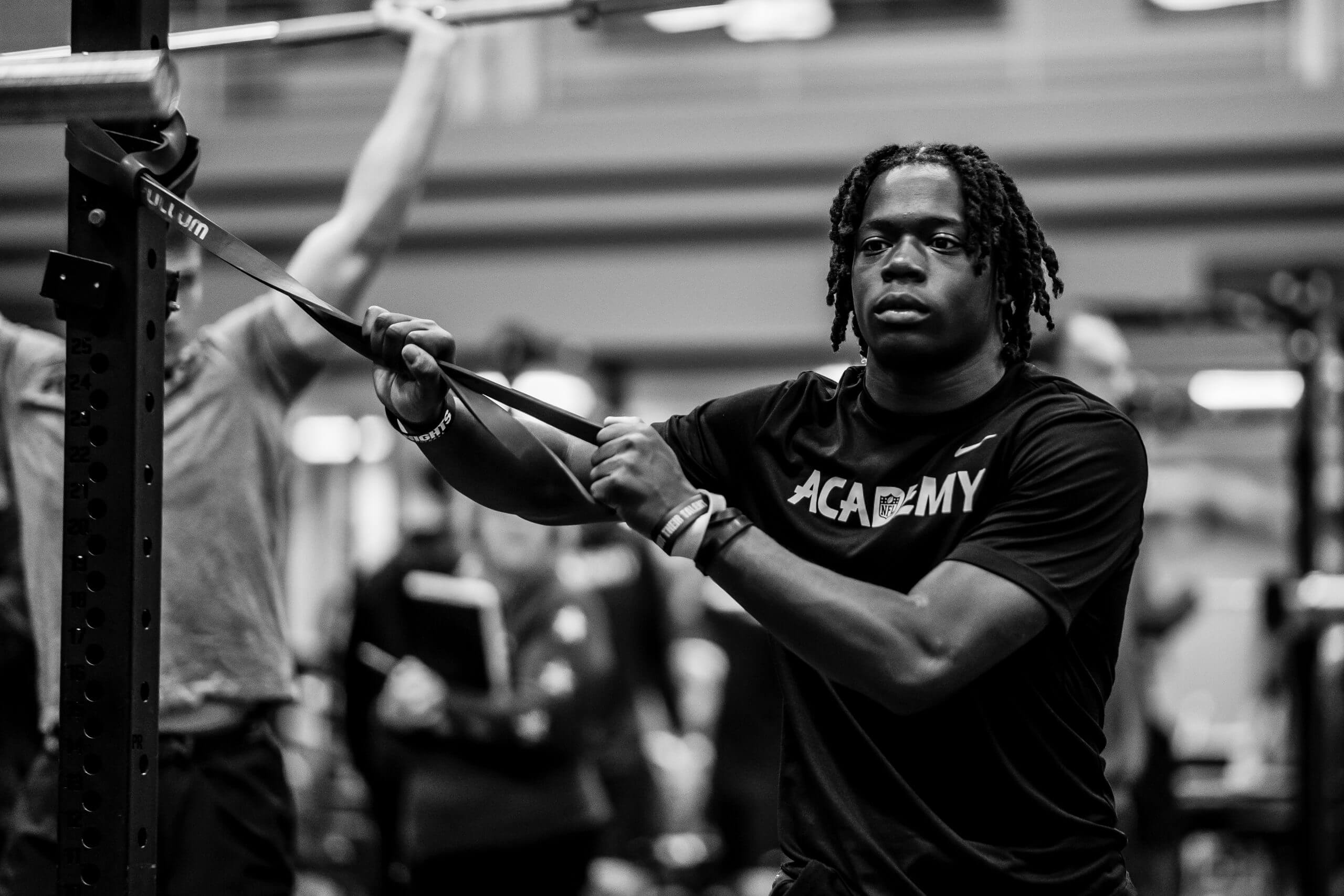
Londoner Nickson Massa working out in the Loughborough gym. (NFL Academy)
Though no one has yet made it to the NFL, the academy has delivered results over the past six years, boasting 40 graduates playing US college football in the 2025-2026 season, with 27 in Division I.
Daniel Akinkunmi (Oklahoma), Emmanuel Okoye (Tennessee), and Seydou Traore (Mississippi State) are all graduates who compete in the Southeastern Conference (SEC), considered one of the best conferences of Division I football, with Traore featuring in the “Any Given Saturday” Netflix documentary released in August.
Seb Harris, 19, from Streatham, south London, graduated from the NFL Academy last year. He is now taking up an internship at NFL UK head offices in marketing/consumer products before starting at University of Mary, a Division II school in North Dakota, next summer.
“Being in the gym, in the classroom (all the time), it’s hard not to improve,” the wide receiver/tight end says. “And in the gym, it’s competitive. If someone puts on weights, you aren’t taking them off.”
Of the one million high-school football players in the United States, around three percent will make a Division I college roster, according to the NCAA.
These colleges are the stepping stone to the NFL, their football teams drawing thousands of fans and generating millions of dollars. In the era of name, image, and likeness (NIL), introduced in 2021, this can also mean players earning money on top of a scholarship.
But the academy players are aware of the steep odds facing them, Harris says. “They (other players) are already in America, the country they want to be in. We have to get over there first,” he explains of the biggest chasm to overcome between themselves and those who have played in the US since childhood.
This was a sentiment echoed by the NFL Academy head coach, Hagen. The 64-year-old has worked as a coach since the 1980s, at the Cleveland Browns, New York Jets and American colleges before joining the academy in 2023.
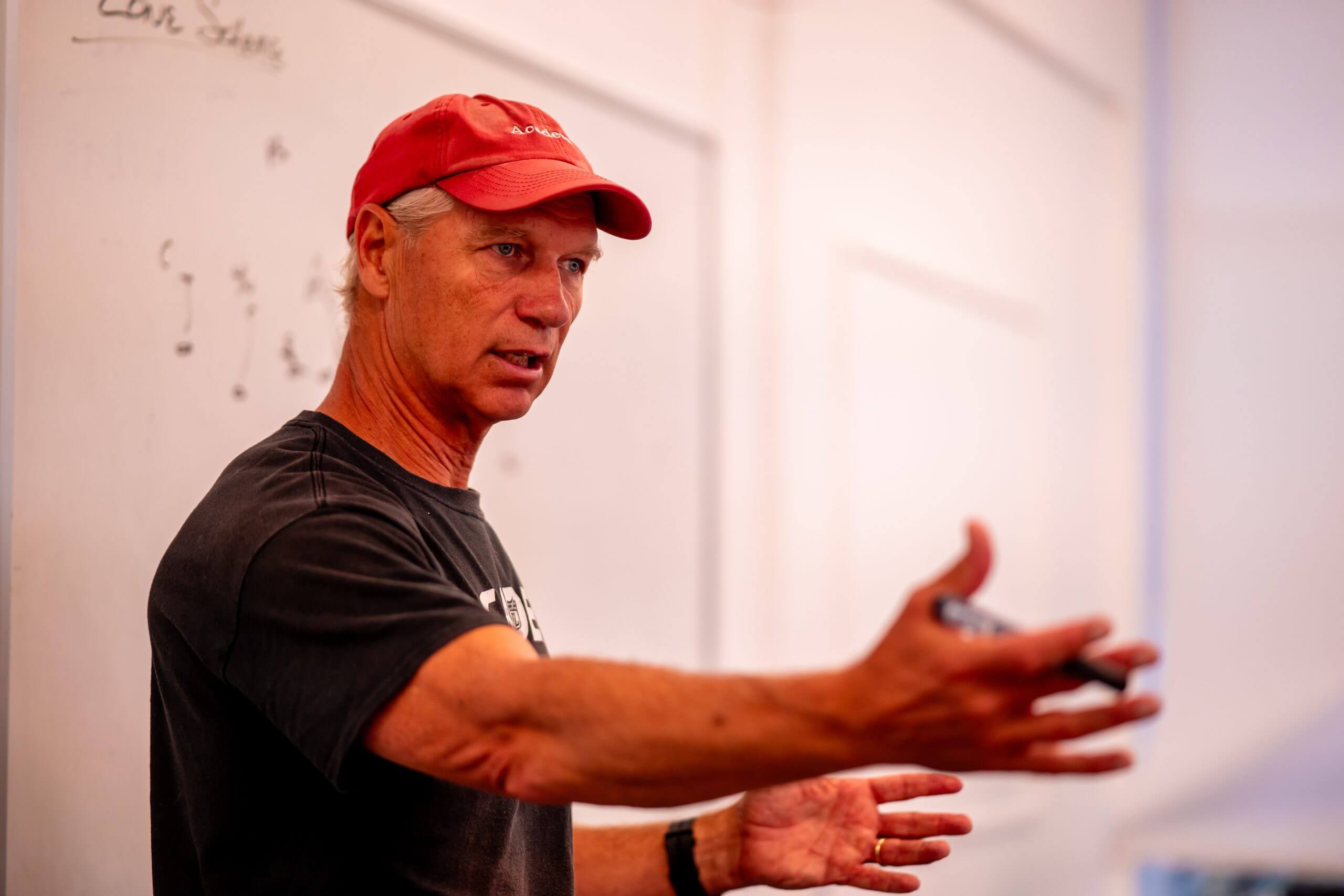
Head coach Steve Hagen pictured briefing the media during The Athletic’s visit. (NFL Academy)
The Tennessee native took the squad to the US this summer, where they were given a rude awakening. They lost 42-7 to Edgewater, a high school in Orlando, in August, but bounced back this month, beating the Düsseldorf Panthers 35-3.
This year’s squad will have more games than previous cohorts, as they are set to play 10 times this season. “We will play anyone, anywhere, any time,” Hagen says.
Since 2023, as a build-up to the NFL London games, they have played one game a year at London’s Tottenham Hotspur Stadium against US high school opponents. It is a chance for scouts to see how the players fare against American counterparts.
On Wednesday, they narrowly lost 38-41 to the seventh-best high school in the US, Florida’s St. Thomas Aquinas, whose graduates include Dallas Cowboys great and Pro Football Hall of Famer Michael Irvin.
One player who stood out as an endzone threat was tight end Luca Wolf. The 18-year-old Austrian, a basketball youth international before joining the academy, has committed to Division I’s University of California, Berkley next summer. But following the game at Tottenham, he received an offer from six-time national champions the University of Tennessee.
Games and camps are pivotal for recruitment, helping players to impress coaches in person and compile their highlight reel.
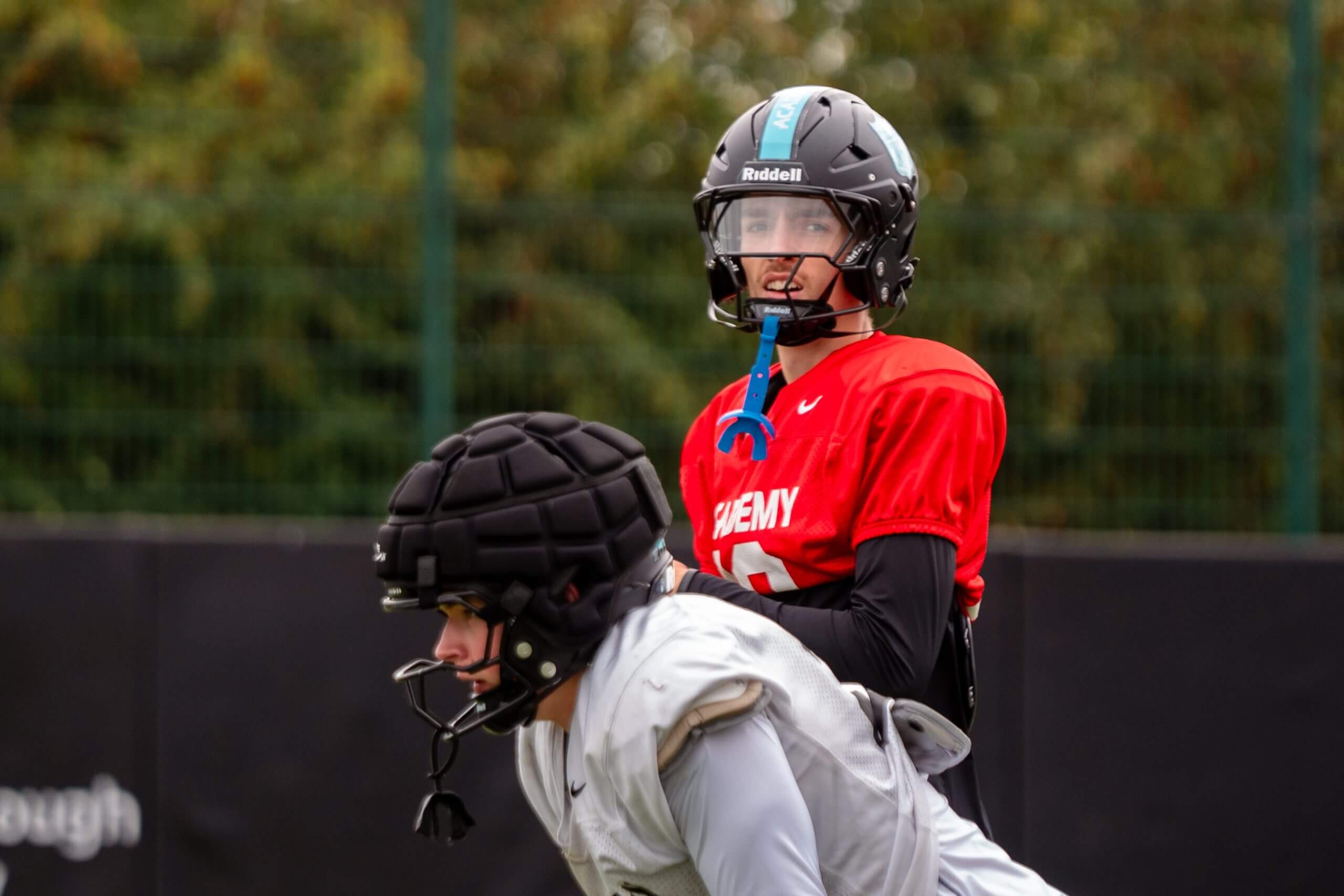
Canadian Viktor Lachambre is the academy’s current quarterback. (NFL Academy)
“We got whacked pretty hard when we went to America, but hopefully that is a wake-up call,” says Hagen. “Some of these guys have only played for eight weeks. The guys we were playing against have been playing since they were eight years old. It’s a big difference.”
The most difficult position to master is, of course, quarterback. “It’s just hard to find good quarterbacks in Europe because the game’s not played like we play in America,” Hagen says.
“The first thing a lot of European teams do is get an American quarterback and I don’t blame them. You need a good quarterback to train your offense and definitely to train your defense.”
Hagen refers to the 16-team European League of Football (ELF), where every quarterback is an American.
But this past summer, academy graduate Sam Fenton became the first British QB to receive a Division I scholarship at the University of South Florida, so there is hope for the future.
American football can be dangerous if you don’t know what you are doing. That’s why, for Hagen, the foundations are laid in the classroom.
“I’m trying to make our guys smart, fast, physical, and fundamental football players who do whatever it takes to win and leave no doubt,” Hagen says of a philosophy his team knows by heart.
The coach aims to improve his players’ understanding of the sport to unlock their physicality. This starts with learning to execute “very simple” plays and schemes.
He gives an example of how being smarter makes players faster. “If I have my eyes on two players and I don’t know who I’m hitting, then I will hesitate and not be as fast. If I know, ‘OK, it’s him who I am hitting,’ then I am going to knock him out,” he says.
“We also put them in an American-style weight room, so I hired an American strength coach (Darren Mustin) to make us stronger.”
Players are judged on physical metrics, such as their bench press and 40-metre dash. The Athletic was pleased to beat Tom Brady’s 40-metre dash time of 5.28 seconds (5.20 for the record) from the 2000 NFL draft combine.
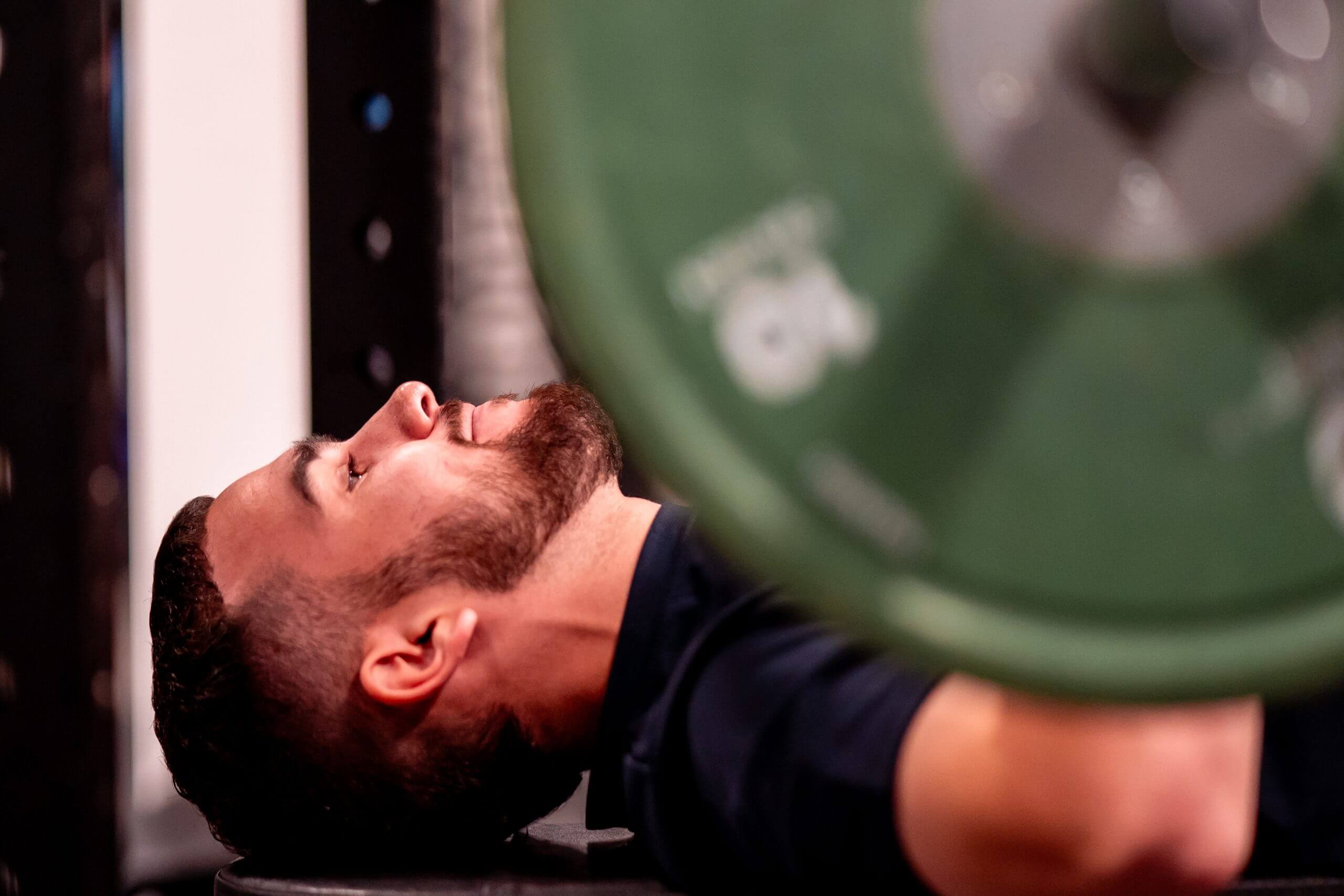
The Athletic’s Eduardo Tansley being put through his paces. (NFL Academy)
Delivering a Q&A with media personnel in a classroom setting, Hagen demanded attention as he broke down his approach to his program. His eyes scan the room like a quarterback, checking we are engaged. There’s no dozing off in his sessions.
That the academy is in the small town of Loughborough is no coincidence, as it boasts the UK’s “largest concentration of world-class sporting facilities,” according to the town’s university, and is home to the British national tennis academy. There are also national training centres for cricket and athletics. Ex-England cricket captain Andrew Flintoff was lunching in the canteen during The Athletic’s visit.
“Loughborough is pretty quiet, but there are cities nearby and it doesn’t have many distractions, so it is a good place to focus,” Kampas says.
Following the gym and a breakfast buffet, class is in session, with lecturer Natasha Bains delivering a psychology lesson called ‘Becoming YOU’ at the college the athletes attend.
They are studying for their A-Levels, qualifications typically studied over a two-year period in England and usually a precursor to university. Their GPA score (General Point Average) needed to attend American colleges is also determined by school exams taken before they join the academy.
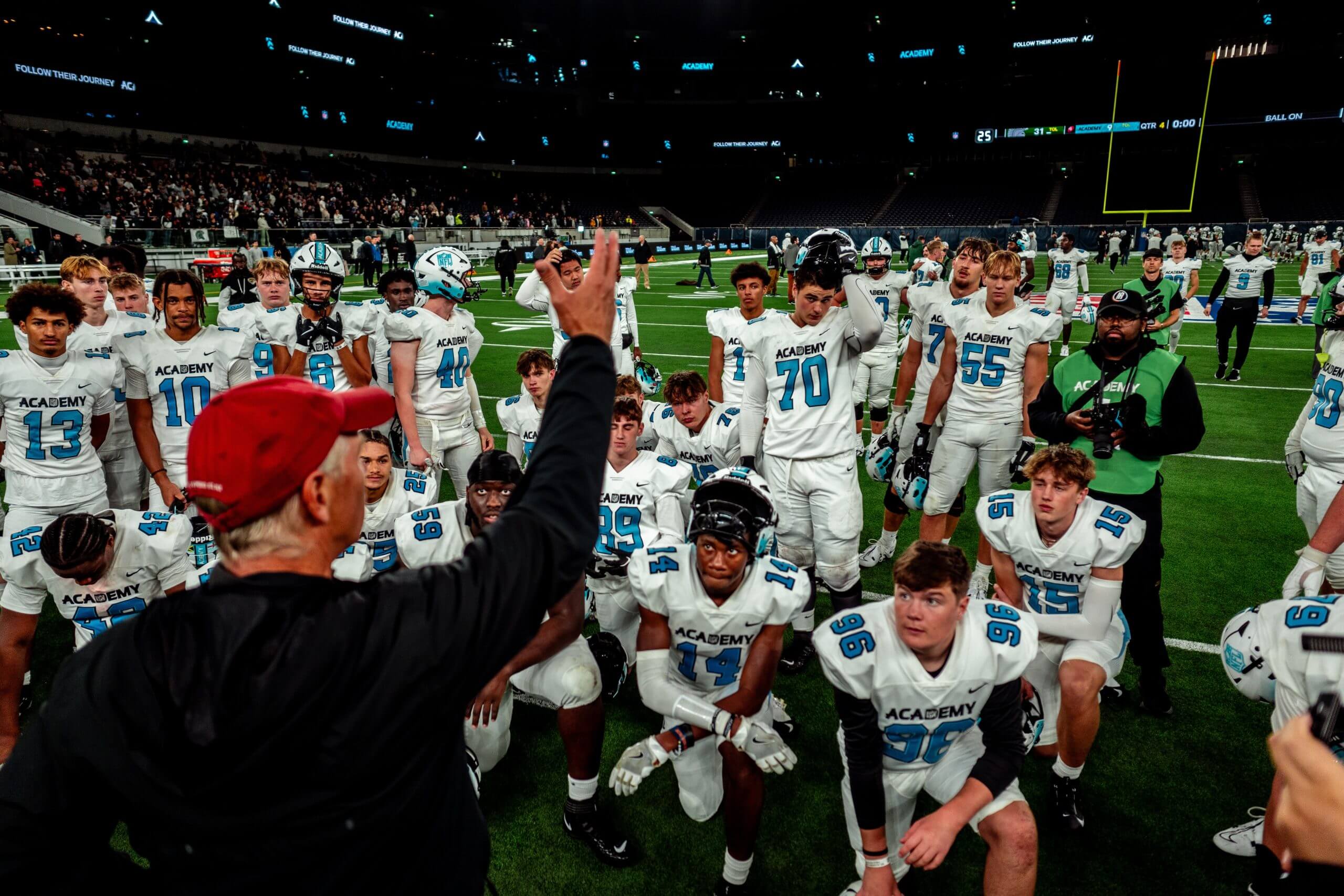
The academy playing at Tottenham Hotspur Stadium. (NFL Academy)
During class, some of the players admit to spending too much time on social media. The purpose of Bains’s lesson is to provide ways to focus on controllable things, to be positive, because en route to a scholarship, there are likely to be many setbacks.
Gavin Collins, the offensive lineman coach, has been at the academy since its inception in 2019, when it was held three days a week in a north London college, and has witnessed many success stories.
“There’s no guarantee, but there is a proven pathway, so we just keep working to create more opportunities for these kids,” he says.
Though the academy has an important role in making American football a truly international sport, it is still waiting for its first graduate to make it to the NFL.
Perhaps we could see Kampas protecting Patrick Mahomes in the years to come. But, as The Athletic discovered, it requires an unwavering commitment to work in the shadows until then.

